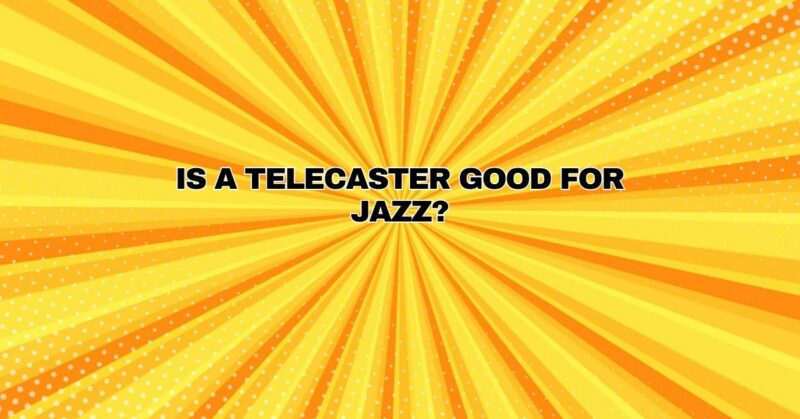When you think of jazz guitar, your mind might conjure images of archtop guitars with warm, mellow tones, or perhaps the iconic hollow-body guitars often associated with jazz legends. However, the Fender Telecaster, known for its twangy and clear sound, may not be the first choice that comes to mind for jazz musicians. In this comprehensive article, we’ll delve into the intriguing realm of using a Telecaster for jazz and whether it can be a good fit for this genre.
The Telecaster’s Unique Qualities:
The Fender Telecaster, with its single-cutaway body, bolt-on neck, and iconic dual-pickup design, has earned its place in music history as a versatile and adaptable instrument. While it may not be the go-to choice for traditional jazz, the Telecaster’s distinctive qualities can bring a fresh perspective to the genre.
1. Clarity and Articulation:
One of the standout features of the Telecaster is its clarity and articulation. The single-coil pickups, particularly the bridge pickup, provide a bright and focused tone. This clarity allows for precise note definition, making it an ideal choice for intricate jazz chord voicings and complex melodic lines. Jazz guitarists who appreciate transparency in their sound may find the Telecaster’s articulation appealing.
2. Dynamic Range:
The Telecaster is known for its dynamic range, responding well to variations in picking technique and touch. Jazz guitarists often rely on nuances in their playing to convey emotion and musicality. The Telecaster’s responsiveness can be advantageous in achieving expressive phrasing and dynamics.
3. Clean Tones:
Jazz guitarists frequently aim for clean, pristine tones that allow the natural character of the guitar and the subtleties of their playing to shine through. The Telecaster’s clean and crisp tones from both pickups, combined with the guitar’s simplicity and lack of excessive tonal coloration, can be a canvas for crafting articulate jazz tones.
4. Versatility:
While the Telecaster is not the traditional choice for jazz, its versatility should not be underestimated. Many modern jazz musicians are pushing boundaries and incorporating diverse elements into their music. The Telecaster’s adaptability allows jazz guitarists to experiment with different styles and sounds, from fusion to contemporary jazz, while retaining the guitar’s core qualities.
Successful Telecaster Jazz Players:
Several accomplished jazz guitarists have embraced the Telecaster, demonstrating its viability in the genre:
- Bill Frisell: Renowned jazz guitarist Bill Frisell has frequently used a Telecaster, showcasing its unique timbre and versatility in various jazz contexts.
- Ed Bickert: Canadian jazz guitarist Ed Bickert is known for his impeccable jazz phrasing and tone, often achieved with a Telecaster.
- Jim Campilongo: Jim Campilongo’s mastery of the Telecaster extends into jazz, blending traditional jazz sensibilities with modern elements.
Considerations and Modifications:
While the Telecaster can excel in jazz, it may require some adjustments to fit your specific needs:
- Pickup Selection: Experiment with both the bridge and neck pickups to find the balance that suits your jazz style. The neck pickup can provide a warmer and rounder tone, while the bridge pickup offers brightness and articulation.
- Tone Control: Adjust the tone control to tailor the guitar’s sound to your liking. Jazz players often dial back the tone knob slightly for a mellower sound.
- Strings: Consider using flatwound or semi-flatwound strings for a smoother and more traditional jazz tone.
In Conclusion:
While the Fender Telecaster may not be the conventional choice for jazz, its unique qualities make it a viable option for jazz guitarists seeking a different sonic palette. Whether you’re drawn to its clarity, articulation, dynamic range, or versatility, the Telecaster can provide a fresh perspective on jazz music. Ultimately, the choice of guitar for jazz is a matter of personal preference, and the Telecaster’s potential in this genre should not be underestimated. It offers a unique opportunity for jazz musicians to explore new horizons while maintaining the genre’s rich traditions.


